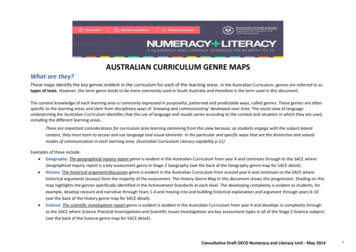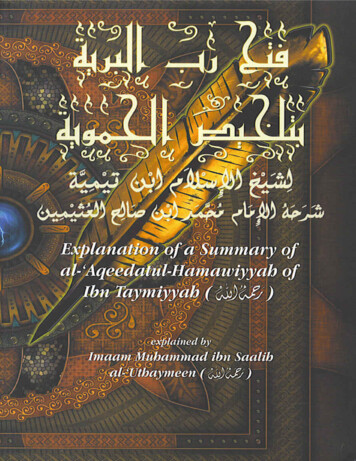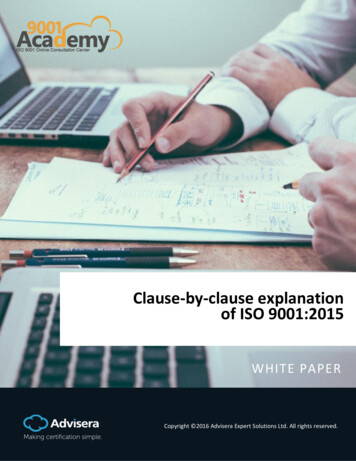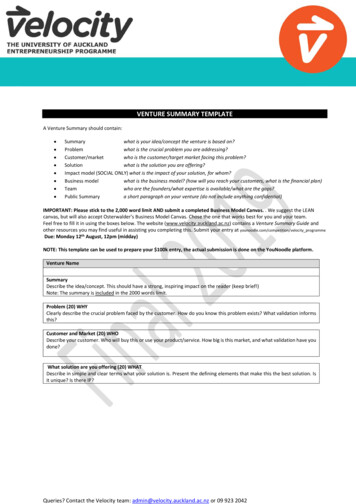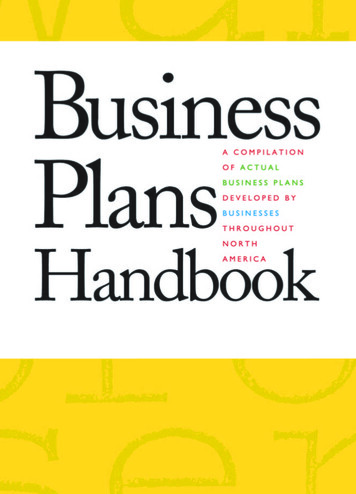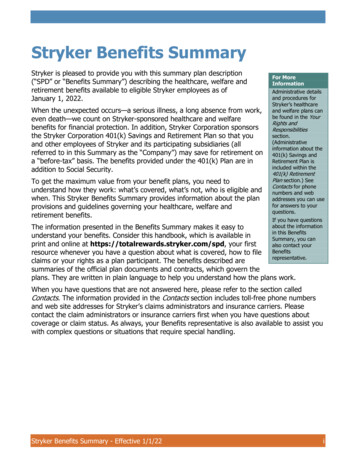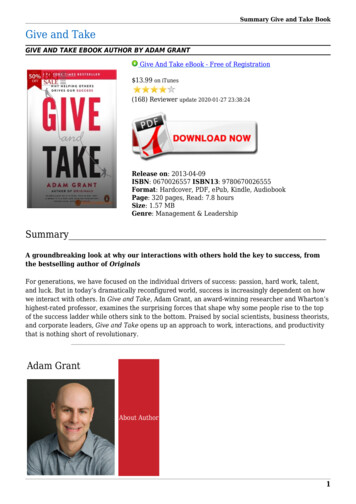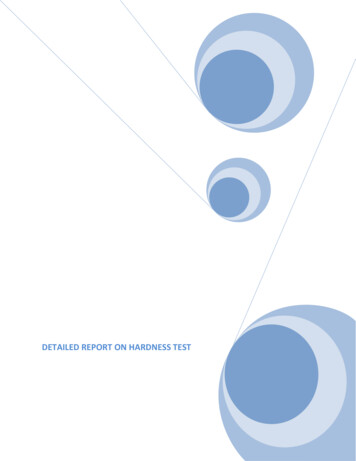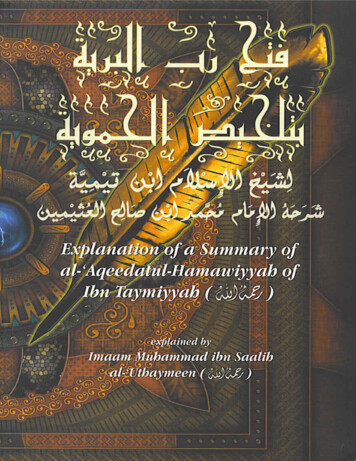
Transcription
Explanation of a Summary of al‐‘Aqeedatul Hamawiyyah of ibn TaymiyyahBy Imaam Muhammad ibn Saalih al‐‘Uthaymeen(We ask Allaah to forgive him, his parents and all the Muslims, Aameen)Translated by Aboo az‐Zubayr ‘Abdur Rahmaan Harrison
Tables of ContentsINTRODUCTIONCHAPTER 1:THE OBLIGATION UPON THE SERVANT REGARDING HIS RELIGIONCHAPTER 2:THE PROPHETʹS MESSAGE INCLUDES THE TRUE EXPLANATION OF THEFOUNDATIONS OF THE RELIGION & ITS DETAILED MATTERSCHAPTER 3:THE WAY OF AHLUS SUNNAH REGARDING ALLAAHʹS NAMES &ATTRIBUTESCHAPTERS 4:EXPLANATION OF THE TERMINOLOGY (TAHREEF, TA’TEEL, TAKYEEF,TAMTHEEL, TASHBEEH, & ILHAAD)CHAPTER 5:THE TRUTH OF THE METHODOLOGY OF THE SALAF AND THEFALSEHOOD OF GIVING PRECEDENCE TO THE METHODOLOGY OF THEKHALAF IN KNOWLEDGES & WISDOMCHAPTER 6:SOME STATEMENTS OF MODERN AUTHORS AGAINST THEMETHODOLOGY OF THE SALAFCHAPTER 7:CONCEALING THE TRUTH WITH FALSEHOOD BY SOME OF THE MODERNAUTHORSCHAPTER 8:THE REPORTED STATEMENTS OF THE SALAF REGARDING THEATTRIBUTESCHAPTER 9:THE HIGHNESS (‘ULUWW) OF ALLAAH & ITS PROOFS
CHAPTER 10:THE SENSE OF ‘POSITION’ AS IT PERTAINS TO ALLAAHCHAPTER 11:THE RISING OF ALLAAH (ISTIWAA) OVER HIS THRONE (‘ARSH) PART ONE PART TWO: THE THRONE (‘ARSH)CHAPTER 12:THE MA’IYYAH OF ALLAAH (BEING WITH HIS CREATION)CHAPTER 13:COMBINING BETWEEN THE TEXTS OF THE HIGHNESS (‘ULUWW) OFALLAAH ABOVE HIS CREATION AND THE MA’IYYAH OF ALLAAH(BEING WITH HIS CREATION)CHAPTER 14:ALLAAHʹS DESCENDING TO THE HEAVEN OF THE DUNYAA PART ONE PART TWO: COMBINING BETWEEN THE TEXTS OF THE ‘ULUWW(HIGHNESS) OF ALLAAH & HIS DESCENDINGCHAPTER 15:AFFIRMING THE ATTRIBUTE OF ALLAAHʹS FACECHAPTER 16:THE TWO HANDS OF ALLAAHCHAPTER 17:THE TWO EYES OF ALLAAHCHAPTER 18:THE FORMS IN WHICH THE ATTRIBUTES OF ALLAAHʹS TWO HANDS &TWO EYES HAVE BEEN REPORTEDCHAPTER 19:THE SPEECH OF ALLAAH PART ONE PART TWO: THE QUR’AAN IS THE SPEECH OF ALLAAH PART THREE: OUR RECITATION OF THE QUR’AAN
CHAPTER 20:THE EMERGENCE OF TA’TEEL AND ITS ORIGINSCHAPTER 21:THE METHODOLOGY OF THOSE WHO DENY ALLAAH’S ATTRIBUTES PART ONE PART TWO: SOME OF THE FALSE ALLEGATIONS OF THISMETHODOLOGY PART THREE: THE DOUBTS & FABRICATIONS THESE DENIERS RELYUPON AS PROOFCHAPTER 22:EACH OF THE TWO GROUPS OF TA’TEEL & TAMTHEEL ACTUALLYCOMBINE BETWEEN BOTH TA’TEEL & TAMTHEELCHAPTER 23:THE SALAFʹS WARNING AGAINST PHILOSOPHICAL SPEECH (‘ILM AL‐KALAAMCHAPTER 24:THE CATEGORIES OF DEVIANT PEOPLE CONCERNING THE BELIEF INALLAAH & THE LAST DAY PART ONE PART TWO: THE METHODOLOGY OF THE PEOPLE OF TA’WEELREGARDING THE AFTER LIFE PART THREE: THE PEOPLE OF TAJHEEL PART FOUR: THE TAFSEER OF THE QUR’AANCHAPTER 25:THE DIVISION OF THE PEOPLE OF THE QIBLAH REGARDING THEAAYAAT & AHAADEETH OF THE ATTRIBUTESCHAPTER 26:THE EVIL NAMES WITH WHICH THE PEOPLE OF INNOVATION REFER TOTHE PEOPLE OF THE SUNNAHCHAPTER 27:ISLAAM & EEMAAN PART ONE
PART TWO: THE INCREASING AND DECREASING OF EEMAANPART THREE: THE WAYS OF INCREASING & DECREASING EEMAANPART FOUR: ISTITHNAA REGARDING EEMAAN
IntroductionAll praise and thanks are due to Allaah. We praise Him, seek His help andHis forgiveness. We seek refuge with Allaah from the evils of our own selves andfrom our bad deeds. Whomever Allaah guides, none can misguide him andwhomever He misguides, there is no guide for him. I testify that nothingdeserves worship except Allaah alone, with no partner and I testify thatMuhammad is His servant and Messenger ‐ may Allaah send prayers upon him,his family, and his companions.As for the following:) with guidance and the trueAllaah has sent Muhammad (religion. He sent him as a mercy to the world, as an example for the workers, andas a proof against all the servants. He (Muhammad) fulfilled the trust, conveyedthe message, advised the Ummah, and he clarified for the people all of what theyneed regarding the foundations of their religion as well as its detailed matters.He left no good except that he clarified it and encouraged it, and he left no evilbut that he warned the Ummah from it so much so that he left his Ummah upona clear, white path ‐ its night as clear as its day. His companions traversed thispath, shining and radiant. Afterwards, the best generations took it from them inthe same state until oppression frowned upon them with the darkness of variousinnovations by which the innovators conspired against Islaam and its people.The people then wandered in confusion purposelessly, and they began buildingtheir ʹAqeedah beliefs upon a spiderʹs web. However, the Lord upholds Hisreligion with His close helpers upon whom He bestows Eemaan, knowledge, andwisdom by which they prevent these enemies. They repel their plot back againsttheir own throats. So no one ever comes out with his innovation except thatAllaah ‐ and for this deserves praise and thanks ‐ destines to send someone fromAhlus‐Sunnah who refutes and disproves his innovation and extinguishes it.There was from the foremost of those who stood up against theseinnovators ‐ Shaykh‐ul‐Islaam Taqiyy‐ud‐Deen Ahmad ibn ʹAbdul‐Haleem ibnʹAbdus‐Salaam ibn Taymiyyah al‐Haraanee, ad‐Dimashqee. He was born inHaraan (in ʹIraaq) on Monday, the 10th of Rabeeʹ al‐Awwal in the Hijrah year of661 and he died while imprisoned oppressively in the fortress of Damascus inDhul‐Qiʹdah in the Hijrah year 728 ‐ may Allaah have mercy on him.He has many works on the clarification and explanation of the Sunnah,the reinforcement of its pillars, and the destruction of innovations.
One of the works on this subject is his “al‐Fatwaa al‐Hamawiyyah” whichhe wrote as an answer to a question presented to him in the Hijrah year of 698from Hamaah, a place in ash‐Shaam. In it, he was asked what the scholars andImaams of the religion say concerning the Aayaat and the Ahaadeeth of theSi/aat, or the attributes and characteristics of Allaah. So he answered in about 83pages and due to which, he suffered trials and afflictions. May Allaah rewardhim on behalf of Islaam and the Muslims with the best of rewards.Due to the difficulty in understanding and comprehending this answerfrom many readers, I wanted to summarize the most important points from italong with some other needed additions. I have named it ʺFathu Rabb‐il‐Bariyyah bi‐Talkhees al‐Hamawiyyah.ʺI first published it in the Hijrah year 1380. I am now publishing it a secondtime and perhaps changing what I see beneficial of additions or deletions.I ask Allaah to make our effort sincerely for His Face and as a benefit toHis servants, for indeed He is Generous and Kind.‐The Author(Muhammad ibn Saalih al‐‘Uthaymeen)
CHAPTER 1The Obligation upon the Servant Regarding His ReligionThe obligation on the servant concerning his religion is following what) says, as wellAllaah says and what His Messenger Muhammad (as the Rightly‐Guided Successors after him from the Companions, and those whofollowed them in righteousness.This is because Allaah sent Muhammad () with clarificationsand guidance and obligated upon all of the people to believe in him and followhim outwardly and inwardly. He () said:ۤ ض ﻻ ِ ﻷ ْر َ ت وَٱ ِ ﺴﻤَﺎوَا ﻚ ٱﻟ ﱠ ُ ﺟﻤِﻴﻌًﺎ ٱﱠﻟﺬِي َﻟ ُﻪ ُﻣ ْﻠ َ ل ٱﻟﻠﱠﻪِ ِإَﻟ ْﻴ ُﻜ ْﻢ ُ س ِإﻧﱢﻲ َرﺳُﻮ ُ ﻞ ﻳٰﺄَ ﱡﻳﻬَﺎ ٱﻟﻨﱠﺎ ْ ُﻗ ِ ﻦ ﺑِﭑﻟﻠﱠﻪ ُ ﻷﻣﱢﻲﱢ ٱﱠﻟﺬِي ُﻳ ْﺆ ِﻣ ُ ﻲ ٱ ﺖ ﻓَﺂ ِﻣﻨُﻮ ْا ﺑِﭑﻟﻠﱠﻪِ َو َرﺳُﻮِﻟ ِﻪ ٱﻟ ﱠﻨ ِﺒ ﱢ ُ ﺤﻴِـﻲ َو ُﻳﻤِﻴ ْ ﻻ ُه َﻮ ُﻳ إِﻟَـٰ َﻪ ِإ ﱠ ن َ َو َآِﻠﻤَﺎ ِﺗ ِﻪ وَٱ ﱠﺗ ِﺒﻌُﻮ ُﻩ َﻟ َﻌﱠﻠ ُﻜ ْﻢ َﺗ ْﻬ َﺘﺪُو ʺSay: ʹOh mankind, indeed I am the Messenger of Allaah to you all,[from Him] to whom belongs the dominion of the heavens and theearth. There is no god but Him; He gives life and causes death.ʺ Sobelieve in Allaah and His Messenger, the unlettered Prophet, whobelieves in Allaah and His Words, and follow him that you may beguided.ʺ [Sooratul‐ʹAraaf, 7:158]And the Prophet () said: وﻋﻀﻮا ، ﻋﻠﻴﻜﻢ ﺑﺴﻨﺘﻲ وﺳﻨﺔ اﻟﺨﻠﻔﺎء اﻟﺮاﺷﺪﻳﻦ اﻟﻤﻬﺪﻳﻴﻦ ﻣﻦ ﺑﻌﺪي ﺗﻤﺴﻜﻮا ﺑﻬﺎ وآﻞ ﺑﺪﻋﺔ ، ﻓﺎن آﻞ ﻣﺤﺪﺛﺔ ﺑﺪﻋﺔ ، وإﻳﺎآﻢ وﻣﺤﺪﺛﺎت اﻷﻣﻮر ، ﻋﻠﻴﻬﺎ ﺑﺎﻟﻨﻮاﺟﺬ . ﺿﻼﻟﺖ ʺIt is incumbent upon you (to follow) my Sunnah and the Sunnah of theRightly‐Guided Successors after me. Hold fast to it and bite onto it withyour molars. And beware of the newly‐invented matters, for everynewly‐invented matter is an innovation and every innovation ismisguidance.ʺ 1Recorded by at‐Tirmidhee (2676) and he said it is Hasan Saheeh. Also recorded by AbooDaawood (4607), Ibn Maajah (42), and Ahmad (4/126). Ibn Hibbaan and al‐Haakim declared it tobe Saheeh.1
The Rightly‐Guided Successors are those who came after and followed theProphet () in beneficial knowledge and righteous action. The mostdeserving of people of this description are the Companions. Allaah chose them) and the establishment offor the companionship of His Prophet (His Religion. And Allaah would not choose ‐ while He is the MostKnowledgeable, the Most Wise ‐ for the companionship of His Prophet exceptthe most complete of people in Eemaan, the highest in intellect, the mostrighteous in action, the most determined, and the closest guided to the path. Sothey are the most deserving of people to be followed after their Prophet(), and after them are the Imaams of the religion, those who areknown for their guidance and well‐being.
CHAPTER 2The Prophetʹs Message Includes the True Explanation of the Foundations ofthe Religion & Its Detailed MattersThe message of the Prophet () is comprised of two things:) said,beneficial knowledge, and righteous action, just as Allaah ( ﻦ ُآﱢﻠ ِﻪ َوَﻟ ْﻮ َآ ِﺮ َﻩ ِ ﻋﻠَﻰ ٱﻟﺪﱢﻳ َ ﻈ ِﻬ َﺮ ُﻩ ْ ﻖ ِﻟ ُﻴ ﺤﱢ َ ﻦ ٱ ْﻟ ِ ﻞ َرﺳُﻮَﻟ ُﻪ ﺑِﭑ ْﻟ ُﻬﺪَىٰ َودِﻳ َ ﺳ َ ُه َﻮ ٱﱠﻟﺬِيۤ َأ ْر ن َ ﺸ ِﺮآُﻮ ْ ٱ ْﻟ ُﻤ ʺIt is He who has sent His Messenger with (1) guidance and (2) thereligion of truth to manifest it over all religions, although theMushrikoon hate it.ʺ [Sooratut‐Tawbah, 9:33]The guidance is the beneficial knowledge, while the religion of truth is therighteous action that is based upon sincerity to Allaah and following HisMessenger ().And beneficial knowledge includes any knowledge that contains a benefitto the Ummah for its life in the Dunyaa and the Hereafter. The first of knowledgethat enters into that is the knowledge of Allaahʹs Names, His Characteristics andAttributes, and His Actions. Knowing this is the most beneficial of all sciencesand it is the most superior of the divine message. It is the summarization of theprophetic Da’wah. By it, the religion is established in statement, action andbelief.For this reason, it is impossible to think the Prophet ()would neglect this knowledge and not completely explain it, leaving no doubtsregarding it and repelling all uncertainties. This is impossible from variousperspectives:Firstly: The Prophet’s () message contains light andguidance. Allaah sent him as a bringer of good news as well as a warner, as acaller to Allaah by His permission and a shining lamp so much so that he left hisUmmah upon a clear, white path – its night as clear as its day. No one deviatesfrom it except that he becomes destroyed. And the greatest of lights and themost significant is what the heart obtains from knowing Allaah, His Names,Attributes and His Actions. Therefore, there is no way that the Prophet
() did not explain this knowledge with the most important ofexplanations.Secondly: The Prophet () taught his Ummah everything thatit needs from the affairs of the religion and the Dunyaa. He even taught themanners of eating, drinking, sitting, sleeping, etc. Aboo Dharr ( )رﺿﻰ اﷲ ﻋﻨﻪ said,) died and there is no bird that flaps itsʺAllaahʹs Messenger (wings except that he mentioned to us some knowledge about it.ʺ There is nodoubt that the knowledge of Allaah, His Names, Attributes, and Actions isincluded under this general principle. Rather, it is the first and foremost due tothe extreme need for it and necessity of knowing it.Thirdly: 2 Eemaan in Allaah, His Names, Attributes, and Actions is thebasis of the whole religion and the summarization of the call of the Messengers.It is the most serious of obligations and the best of what the hearts gain, and thebest of what the intellects perceive. So how would the Prophet ()neglect it without teaching and explaining it while he taught what was of lessimportance and virtue?!Fourthly: The Prophet () was the most knowledgeableperson of his Lord. He was the most sincere adviser to the creation and the mosteloquent in conveying and explaining the message. Therefore, it is not possible,with this complete conveyance, that he would leave explaining the issue ofEemaan in Allaah, His Names and Attributes, leaving it unclear andquestionable.Fifthly: The companions ( )رﺿﻰ اﷲ ﻋﻨﻬﻢ must have spoken correctlyconcerning this issue (Allaahʹs Names, Attributes, and Actions) because theopposite of this would either be (1) ‐ that they remained silent regarding it or (2) ‐that they spoke falsely concerning it. Both of these are impossible regarding theCompanions.1. As for the point that the Companions remained silent on the matter ofthe ʹAqeedah of Allaahʹs Names and Attributes, then this is impossible due to thefollowing reasons. Either, their silence was due to their own ignorance of whatAllaah obligated regarding the Names and Attributes, and what He has madeHere, Shaykh ibn al‐ʹUthaymeen is still mentioning the various aspects that disprove theassumption that the Prophet did not completely explain the issue of Eemaan in Allaahʹs Names,Attributes, and Actions. (T.N.)2
permissible and prohibited; or their silence was based upon a certain knowledgethey had regarding that, yet they concealed it. And both of these are alsoimpossible:As for their remaining silent due to ignorance: Then there is no heartwith life, awareness, a search for knowledge, and a desire for worship except thatits greatest concern would be the search for Eemaan in Allaah, and knowing HisNames and Attributes, and actualizing that with certain knowledge andʹAqeedah. There is no doubt that the best generations ‐ the best of them being theCompanions ‐ were the most complete of people regarding the life of the hearts,loving of good, and actualizing beneficial knowledge. For this, the Prophet() said, ﺛﻢ اﻟﺬﻳﻦ ﻳﻠﻮﻧﻬﻢ ، ﺛﻢ اﻟﺬﻳﻦ ﻳﻠﻮﻧﻬﻢ ، ﺧﻴﺮ اﻟﻨﺎس ﻗﺮﻧﻲ ʺThe best of people are my generation, then those who follow afterthem, and then those who follow after them.ʺ 3This preference is general encompassing their virtue in everything thatbrings one closer to Allaah from statements, actions, or beliefs.In addition, if we assume that the Companions were ignorant of the truthregarding this matter, then the ignorance of those who came after them would beeven more obvious. This is because knowing what is affirmed to Allaah of theNames and Attributes, or what is negated from Him ‐ this is only learned by wayof Messengership and the Companions are the intermediary between the) and the Ummah. So based upon this assumption, itMessenger (means that no one has any knowledge regarding this matter and this is obviouslyunreasonable.As for their remaining silent due to concealing the truth: Everyintelligent and just person who knows the situation of the Companions ( رﺿﻰ اﷲ )ﻋﻨﻬﻢ and their concern with spreading the beneficial knowledge and conveying itto the Ummah, would never accuse them of concealing the truth, especially notin the most serious and obligated of all matters ‐ knowing Allaah, His Namesand Attributes.3Recorded by al‐Bukhaaree (2652) and Muslim (2533).
In addition, there has already come from them many true statementsregarding this issue and anyone who seeks them and follows them would knowabout this.2. As for the point that the Companions spoke incorrectly on the matter ofthe ʹAqeedah of Allaah’s Names and Attributes, then this is false for two reasons.First: Speaking falsely about an issue would mean that it would not bepossible to base any sound proof upon such statements. Moreover, it is knownthat the Companions ( )رﺿﻰ اﷲ ﻋﻨﻬﻢ are the farthest of people in speaking about amatter upon which no sound proof could be based, especially if that matter is inregards to Eemaan in Allaah and the affairs of the unseen. As so, they are thefirst people to practice Allaahʹs command, ﻞ ْ ﻋ ِ ﻚ ِﺑ ِﻪ َ ﺲ َﻟ َ ﻒ ﻣَﺎ َﻟ ْﻴ ُ ﻻ َﺗ ْﻘ َ َو ʺAnd donʹt pursue (say) that of which you have no knowledge (of).ʺ[Sooratul‐Israa, 17:36]And His statement: ﻖ َوأَن ﺤﱢ َ ﻲ ِﺑ َﻐ ْﻴ ِﺮ ا ْﻟ َ ﻹ ْﺛ َﻢ وَا ْﻟ َﺒ ْﻐ ِ ﻦ وَا َ ﻄ َ ﻇ َﻬ َﺮ ﻣِ ْﻨﻬَﺎ وَﻣَﺎ َﺑ َ ﺶ ﻣَﺎ َ ﺣ ِ ﻲ ا ْﻟ َﻔﻮَا َ ﺣ ﱠﺮ َم َر ﱢﺑ َ ﻞ إِ ﱠﻧﻤَﺎ ْ ُﻗ َ ﻻ ﺗَ ْﻌﻠَﻤُﻮن َ ﺳ ْﻠﻄَﺎﻧًﺎ َوأَن َﺗﻘُﻮﻟُﻮ ْا ﻋَﻠَﻰ اﻟﻠّﻪِ ﻣَﺎ ُ ل ِﺑ ِﻪ ْ ﺸ ِﺮآُﻮ ْا ﺑِﺎﻟﻠّﻪِ ﻣَﺎ َﻟ ْﻢ ُﻳ َﻨ ﱢﺰ ْ ُﺗ Say: My Lord has indeed forbidden are immoralities ‐ whethercommitted openly or secretly, sins (of all kinds), unrighteousoppression, joining partners (in worship) with Allah for which He hasgiven no authority, and saying things about Allaah what you don’tknow.ʺ [Sooratul‐‘Araaf, 7:33]Second: Speaking falsely about any matter has its origin based eitherupon true ignorance of the truth, or upon a desire to misguide the creation (whileactually knowing the truth). Again, both of these are impossible pertaining to therights of the Companions ( )رﺿﻰ اﷲ ﻋﻨﻬﻢ .As for the impossibility of a true ignorance of the matter, then this hasalready been explained.
As for the impossibility of a desire to misguide the creation, then thiswould be a very evil objective. It is impractical to think this would come from theCompanions ‐ those who were known for their absolute advice and concern forthe well‐being and love of good for the Ummah.In addition, if we hold that it is possible for them to have evil objectivesand intentions regarding this matter, then we must also hold the possibility thatthey would likewise have evil intentions in what they said regarding all the othersubjects of knowledge and religion. In this case, placing trust upon theirstatements and information about these subjects would vanish. Of course, this isone of the falsest of accusations because it would constitute a slander against thewhole Shareeʹah.Therefore, if it is clear that the Companions ( )رﺿﻰ اﷲ ﻋﻨﻬﻢ must havespoken truthfully and correctly, regarding this matter; then they were speakingeither simply from their intellects or by way of revelation. The first is notprobable because the intellect cannot possibly perceive all of the details of whatAllaah has obligated regarding His Attributes of perfection. Therefore, thesecond option is left, and that is that they learned this knowledge by way of themessage of the Prophet (). If so, then that would necessitate thatthe Prophet () explained the truth regarding Allaahʹs Names andAttributes ‐ and this is the required belief.
CHAPTER 3The Way of Ahlus‐Sunnah Regarding Allaahʹs Names & AttributesAhlus‐Sunnah wal‐]amaaʹah: They are the ones who have united upon) and working according to ittaking the Sunnah of the Prophet (outwardly and inwardly in speech, action, and beliefs. Their way of dealing withthe Names and Attributes of Allaah is as follows:Firstly: Regarding Ithbaat (Affirmation) ‐ Affirming whatever Allaah hasaffirmed for Himself in His Book, or upon the tongue of the Messenger of Allaah() without making Tahreef, Taʹteel, Takyeef, nor Tamtheel. 4Secondly: Regarding Nafee (Negation) ‐ Their approach is to negatewhatever Allaah has negated from Himself in His Book, or upon the tongue of), while at the same time holding the ʹAqeedah ofHis Messenger (affirming the perfection of its opposite to Allaah.Thirdly: In those issues in which no negation nor affirmation has beenreported, the issues that people have disputed about such as Allaahʹs body, orAllaah occupying a certain space, or position, etc.; Ahlus‐Sunnah withhold fromspeaking about it. They neither affirm nor negate these issues due to the fact thatnothing has come to us regarding them. As for the meanings of these, then theyseek more details. For example, if these issues intend evil and falsehood, thenthey refute them and declare Allaah free from these imperfections. However, ifthey intend the truth and they do not contradict Allaah, then they may acceptthem.This approach is the required path to take. It is the middle course betweenthe People of Taʹteel and the People of Tamtheel.Both the intellect and what has been conveyed indicate the obligation ofthis path in dealing with the Names and Attributes of Allaah.As for the intellect: The proof of this is the fact that detailed statementsregarding what is obligatory, permissible, and prohibited regarding Allaah is notShaykh Ibn al‐ʹUthaymeen will explain all of these terms shortly. However, in order to fullyunderstand the information provided before their explanation, it may be preferable to skip aheadto understand these terms and then come back to this point. This may help in a betterunderstanding of the points Shaykh Ibn al‐ʹUthaymeen is making, and Allaah knows best. (T.N.)4
perceived except through what has been conveyed (through revelation).Therefore, it is then necessary to follow whatever has been conveyed byaffirming whatever has been affirmed, negating whatever has been negated, andremaining silent on what has not been mentioned.As for what has been conveyed: From these proofs is the statement of):Allaah ( ن ﻣَﺎ َ ﺠ َﺰ ْو ْ ﺳ ُﻴ َ ﺳﻤَﺂ ِﺋ ِﻪ ْ ن ﻓِﻲ َأ َ ﺤﺪُو ِ ﻦ ُﻳ ْﻠ َ ﺴﻨَﻰ ﻓَﺎ ْدﻋُﻮ ُﻩ ﺑِﻬَﺎ َو َذرُو ْا اﱠﻟﺬِﻳ ْ ﺤ ُ ﺳﻤَﺎء ا ْﻟ ْ ﻷ َ َوِﻟّﻠ ِﻪ ا ن َ آَﺎﻧُﻮ ْا َﻳ ْﻌ َﻤﻠُﻮ ʺAnd to Allaah belong the best names, so call upon Him using them.And leave those who deviate (make Ilhaad) concerning His Names.They will be recompensed for what they have been doing.ʺ [Sooratul‐ʹAraaf, 7:180]And His statement, ﺴﻤِﻴ ُﻊ اﻟ َﺒﺼِﻲ ﻲ ٌء َو ُه َﻮ اﻟ ﱠ ْ َ ﺲ َآ ِﻤ ْﺜِﻠ ِﻪ ﺷ َ َﻟ ْﻴ ʺThere is nothing like Him, and He is the Hearing, the Seeing.ʺ[Sooratush‐Shooraa, 42:11]And His statement, ﻞ ْ ﻋ ِ ﻚ ِﺑ ِﻪ َ ﺲ َﻟ َ ﻒ ﻣَﺎ َﻟ ْﻴ ُ ﻻ َﺗ ْﻘ َ َو ʺAnd donʹt pursue (say) that of which you have no knowledge (about).ʺ[Sooratul‐Israa, 17:36]The First Aayah proves the obligation of Ithbaat (Affirmation) withoutmaking Tahreef or Taʹteel because both of these are a form of Ilhaad (Deviation).The Second Aayah proves the obligation of negating any form ofTamtheel.The Third Aayah proves the negation of any form of Takyeef, as well aswithholding and remaining silent in regards to whatever neither Ithbaat(Affirmation) nor Nafee (Negation) has been reported.
Everything that has been affirmed for Allaah of attributes, then they areattributes and characteristics of perfection, upon which He is praised for andthere is no form of defect whatsoever with them. So all of the attributes ofperfection are affirmed for Allaah in their most complete forms.Likewise, everything that Allaah has negated from Himself is an imperfector defective attribute that contradicts His perfection. Therefore, all attributes andcharacteristics of imperfection are not to be associated with Allaah due to Hisabsolute perfection. Additionally, whatever Allaah negates from Himself, thenwhat is required is to negate that attribute as well as to affirm the oppositeattribute with perfection. This is because negation alone does not indicatecomplete perfection unless and until it includes affirming a praiseworthyattribute. Negation alone could be due to a reason such as inability or weaknessand therefore be a defect.The reason for the negation of a certain characteristic could possibly bedue to a lack of capability (of having that characteristic). In that case, it would notbe praiseworthy, such as saying, ʺThe wall doesnʹt provide any shade.ʺIf this is clear, then we say that whenever Allaah negates from Himselfoppression and injustice, 5 for example, then what is required is to negate thatparticular attribute of oppression and injustice while also affirming the completeopposite to Allaah, which is perfect justice and fairness. Similarly, when Henegates fatigue and tiredness from Himself, 6 then what is required is to, negatethe attribute of fatigue while also affirming its opposite, which is perfectstrength. This is the way in dealing with the rest of the attributes that Allaahnegates from Himself, and Allaah knows best.Such as the Aayah, “And surely Allaah is not unjust to (His) servants.ʺ [Soorah Aali‐ʹImraan,3:182]. (T.N.)6 Such as the Aayah, ʺAnd indeed We created the heavens and the earth and all between themin six days and nothing of fatigue touched Us.ʺ [Sooratul‐Qaaf, 50:38]. (T.N.)5
Explanation of the Terminology(Tahreef, Taʹteel, Takyeef, Tamtheel, Tashbeeh, & Ilhaad)The Meaning of TahreefLinguistically: ʺChangingʺIn Islaamic terminology: ʺChanging a text in wording or meaning.ʺChanging the word of a text may or may not also change the meaningalong with it. Tahreef is of three types:1. Tahreef that changes the wording as well as the meaning ‐ such as theTahreef made by some (innovators) of Allaahʹs statement, َو َآﱠﻠ َﻢ اﻟﻠّ ُﻪ ﻣُﻮﺳَﻰ َﺗ ْﻜﻠِﻴﻤ ًﺎ ʺAnd Allaah spoke to Moosaa with (direct) speech.ʺ [Sooratun‐Nisaa,4:164]They change the text ʺAllaahʺ to make it in the accusative case (making itthe direct object) to mean that the speech was spoken by Moosaa to Allaah.2. Tahreef that changes the wording but not the meaning ‐ such asreciting ʺal‐Hamdu lillaah.ʺ in Soorah al‐Faatihah to ʺal‐Hamda lillaah.ʺ ب ا ْﻟﻌَﺎَﻟﻤِﻲ ﺤ ْﻤ ُﺪ ﻟّﻠ ِﻪ َر ﱢ َ ا ْﻟ ʺAll praise and thanks are due to Allaah, the Lord of the Worldsʺ[Sooratul‐Faatihah, 1:1] 7Most of the time this occurs only from someone who is unaware (of thecorrect pronunciation or by mistake) if he does not have a certain intention fordoing so.Shaykh Ibn al‐ʹUthaymeen holds the opinion that this is the first actual Aayah of Soorah al‐Faatihah and not the ʹBasmalahʹ as is written in most copies of the Qurʹaan. See Tafseer JuzʹAmma by the author or his Tafseer Sooratul‐Baqarah. (T.N.)7
3. Tahreef that changes the meaning only ‐ such as changing the meaningof a word from its apparent meaning with no proof. An example of this ischanging the meaning of the Two Hands when they are associated with Allaah tomean ʺstrengthʺ or ʺblessingsʺ and whatever is similar to this.The Meaning of TaʹteelLinguistically: ʺStripping away, emptyingʺIn Islaamic terminology: ʺDenying the Names and Attributes of Allaah, ordenying some of them.ʺTaʹteel is of two types:1. Absolute Taʹteel‐ such as the Taʹteel made by the Jahmiyyah who denyall of the Attributes while the extremely deviant ones among them even deny theNames of Allaah as well.2. Partial Taʹteel ‐ such as the Taʹteel made by the Ashaʹriyyah who denysome of the Attributes while affirming others. The first person to be known formaking Taʹteel in this Ummah was al‐Jaʹd ibn Dirham.The Meaning of TakyeefTakyeef is to speak (or hold a belief) about ʺhowʺ an attribute is, such assaying, ʺAllaahʹs Hands are like.ʺ or ʺHis descending to the heaven of theDunyaa is like.ʺThe Meaning of Tamtheel and TashbeehTamtheel is to acknowledge that something is equal to something else.Tashbeeh is to acknowledge that something is similar to something else.Therefore, Tamtheel is to make a likeness between two things in allperspectives, and Tashbeeh is to make a likeness between them in most of their
characteristics. Sometimes they are used interchangeably. The difference betweenthem (Tamtheel and Tashbeeh) and Takyeef is from two aspects:1. Takyeef is to speak (hold a belief, or seek an understanding) aboutʺhowʺ something is with or without affirming something to be similar to it. Asfor Tamtheel and Tashbeeh, they indicate a ʺhowʺ something is while affirmingequality or likeness with something else.From this point of view, Takyeef is more general because everyone whomakes Tamtheel is also making Takyeef, but not the other way around.2. Takyeef is specific to the Attributes of Allaah. However, Tamtheel couldbe made concerning Qadr, the Attributes, and the Essence or Being (of Allaah).From this point of view, Tamtheel is then more general due to its beingassociated with the Self or Being, the & Attributes, or Qadr.In addition, Tashbeeh, which has led many people astray, is of two types:1. Making Tashbeeh by acknowledging that the creation is similar to theCreator.2. Making Tashbeeh by acknowledging that the Creator is similar to thecreation.As for making Tashbeeh by making the creation similar to the Creator,then this means affirming that the creation possesses something which is onlyspecific to the Creator from actions, rights, or attributes.Tashbeeh in Action: An example of this would be what someone doeswho makes Shirk with Allaah in His Ruboobiyyoh, such as claiming that there isanother creator along with Allaah.Tashbeeh in Rights: An example of this would be what the Mushrikoondo with their idols claiming that they have a right to be worshipped. Therefore,they worshipped them along with Allaah.Tashbeeh in Attributes: An example of this would be what the extremistsdo concerning their praise of the Prophet () or others such as theverse of poetry by the famous poet al‐Mutanabbee while he was praising
‘Abdullaah ibn Yahyaa al‐Buhtaree, ʺSo be as you are, oh one who has noequal.ʺAs for making Tashbeeh by making the Creator similar to the creation,then this means affirming something of the Essence or Being of Allaah or HisAttributes from what is specific to the creation. An example would be saying thatthe Hands of Allaah are like the hands of created beings, or that His rising overHis Throne is like the way a created being would rise over something.It is said that the first person to be known for this type was Hishaam ibnal‐Hakam the Raafidhee (the extremists of the Sheeʹah), and Allaah knows best.The Meaning of IlhaadLinguistically: ʺDeviating, inclining away fromʺIn Islaamic terminology: ʺDeviating away from what is required ofʹAqeedah or actions.ʺIt is of two types: Firstly: Regarding the Names of Allaah. Secondly: Regarding His Aayaat.As for Ilhaad regarding the Names of Allaah, it is to deviate from the truththat is required regarding them and it is of four types:1. To deny something of the Names of Allaah, or denying something ofthe Attributes that
innovators ‐ Shaykh‐ul‐Islaam Taqiyy‐ud‐Deen Ahmad ibn ʹAbdul‐Haleem ibn ʹAbdus‐Salaam ibn Taymiyyah al‐Haraanee, ad‐Dimashqee. He was born in Haraan (in ʹIraaq) on Monday, the 10th of Rabeeʹ al‐Awwal in the Hijrah year of
